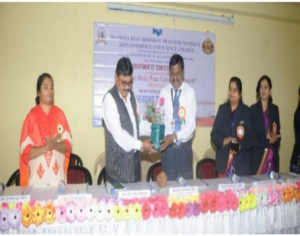B.B.A.(Computer Application) / BCA
Bachelor of Business Administration (Computer Application)
Intake Capacity- 80
Three Year B.B.A. Degree Program in COMPUTER APPLICATION
(Faculty of Commerce and management)
Choice Based Credit System
Preamble: The degree shall be titled as Bachelor of Business Administration( Computer Application) under the Faculty of Commerce and Management. First Year B.B.A.(CA) choice-based credit system is implemented w.e.f. the academic year 2019-2020
The programme structure of BBA(CA) is designed to produce skill oriented human resource, to import practical skills among students, to make industry ready resource, to bring the spirit of entrepreneurship.
| Sr. No. | Name | Education | Designation | Exprience | Photo |
|---|---|---|---|---|---|
| 1 | Prof. Mane Rupali B. | M.C.A(Mngt) | HOD | 14 Years |  |
| 2 | Prof. Marodkar Pranita V. | M.C.A(Eng. and Technology) | Assistant Professor | 14 Years |  |
| 3 | Prof. Mahajan Shivani P. | M.C.A(Mngt) | Assistant Professor | 7 Years |  |
| 4 | Prof. Dhaybar Manisha V. | M.C.A(Mngt) | Assistant Professor | 6 Years |  |
| Department of BBA(Computer Application) | |
| Program Outcomes (PO) | |
| PO1 | Apply knowledge of computing fundamentals, mathematics and domain knowledge Appropriate for the conceptualization of computing models. |
| PO2 | Identify, analyze, formulate, Design and develop the real world requirements by critical Thinking for complex problems in IT enabled services. (Critical Thinking & problem Solving approach) |
| PO3 | Recognize the need and adopt appropriate tools and techniques for modern computing Practices. (Usage of modern tools) |
| PO4 | Communicate effectively with society at large, such as, being able to comprehend and Write effective reports, design documentation and make effective presentations. (communication & team work) |
| PO5 | Make use of ethical practices and cyber regulations in the computing field for Managing software projects in diverse environments. (Ethics & Management) |
|
Department of BBA(Computer Application) |
|
| Program Specific Outcome | |
| PSO1 | The focus of BBA CA Programmer (CBCS-2019 Pattern) has always been raising the academic standards, excellence and holistic development of students |
| PSO2 | Students should be able to apply modern practices and strategies in software project development using open-ended programming environments to deliver quality product for business success in context with societal needs. |
| PSO3 |
An ability to gain knowledge on design and control strategy; techniques to secure information and adapt to the fast-changing world of information technology needs. |
| PSO4 |
Design and develop Web and Mobile based computer applications |








